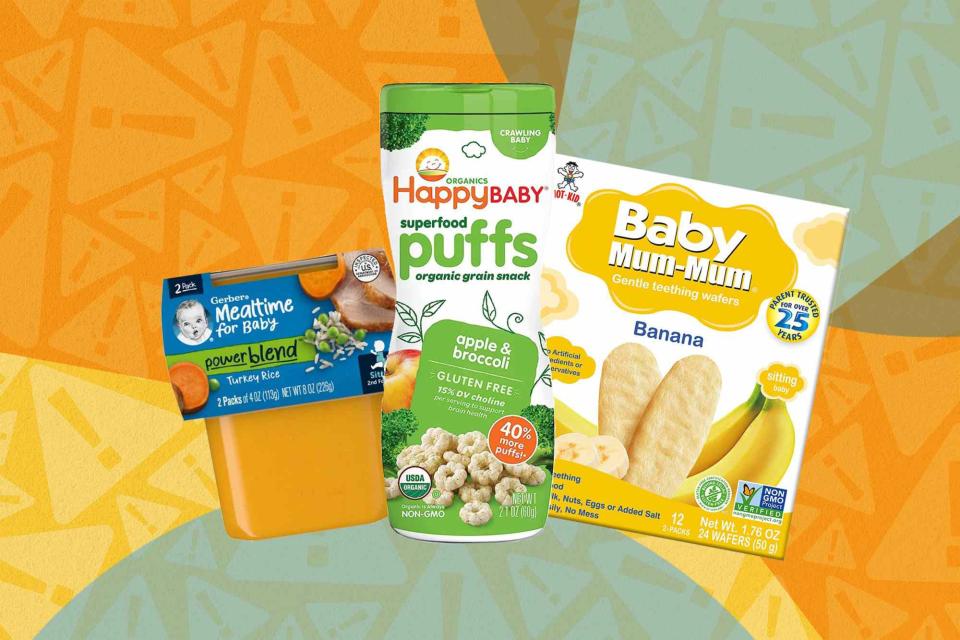Consumer Reports Found Lead, Cadmium and Arsenic in Some Popular Baby Food Brands—Here's What to Know
Read on to learn more about the recent report.

Reviewed by Dietitian Emily Lachtrupp, M.S., RD
In 2018, Consumer Reports tested 50 different baby food products and found that 33 of them contained concerning amounts of lead, arsenic and cadmium. Now, five years later, CR retested the seven most concerning baby foods from that initial report alongside seven other popular products to see if heavy metals are still present in the food.
Here's a breakdown of the products—ranging from meals to entrees and snacks—marked safe and marked concerning for a baby's health.
Related: 9 Foods Pregnant People Should Eat Every Day, According to a Dietitian
In the new report, the following baby food products were tested for the three heavy metals and are noted safe by CR for infants to consume, in comparison to other products:
Earth's Best Organic Sunny Days Snack Bars, Strawberry
Gerber Natural for Baby, Pear Carrot Pea
Gerber Snacks for Baby Teethers, Strawberry Apple Spinach
Earth's Best Organic Spinach Lentil Brown Rice Veggie & Protein Puree
Hot Kid Baby Mum-Mum Teething Wafers, Banana
CR states that at least two servings of the above foods are safe for babies to eat (check the specific amounts recommended here). There are a few snack products that appear to be on the fence, which are the Happy Baby Organics Superfood Puffs in three flavors: Apple & Broccoli, Banana & Pumpkin and Purple Carrot & Blueberry. CR recommends not feeding your child more than 1.5 servings of these puffs.
The following baby food products are the most concerning, according to CR:
Gerber Natural for Baby Veggiepower, Pea Carrot Spinach
Earth's Best Organic Sweet Potato, Squash & Chicken
Beech-Nut Naturals, Sweet Potato
Gerber Chicken Rice Dinner
Gerber Sweet Potato Turkey with Whole Grains Dinner
Gerber Turkey Rice Dinner
Related: The Top 10 Healthiest Foods for Kids
CR cautions that babies should not be consuming a full serving of these products due to the amounts of heavy metals. While low exposure to heavy metals is generally safe, it's important to consider these products in relation to the rest of the diet.
"Because heavy metals are so pervasive in foods—and because they tend to accumulate in the body—small exposures from multiple foods can add up," CR chemist Eric Boring, Ph.D., said in the report. "And feeding your child amounts close to the daily serving limits leaves little room for exposure to heavy metals from other foods."
What's causing the presence of lead, cadmium and arsenic in baby food? Sweet potatoes, rice and carrots seem to be the source of products with high levels of heavy metals, but these foods can still be included in a baby's healthy eating pattern.
"These are nutritious foods, so you don't have to eliminate them from your child's diet," CR nutritionist Amy Keating, RD, said. "Instead, serve them in rotation with many different vegetables and whole grains."
Keating recommends including these low-heavy-metal foods in that healthy rotation: infant cereals made from oats and other whole grains (except rice); fresh and frozen fruit; peas, green beans and butternut squash; baby-food meats; eggs; beans; applesauce (unsweetened); cheese; and yogurt.
For more information and tips, read the full report here.
Up next: Consumer Reports Just Found Lead and Cadmium in Some Popular Dark Chocolate Brands

